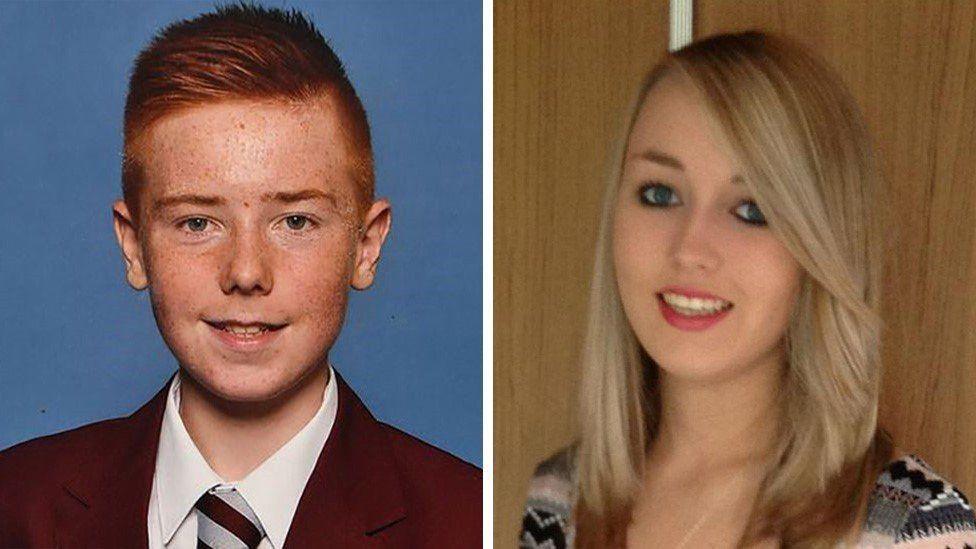17-year-old boy dies at Polmont Young Offenders Institution

- Published
A 17-year-old boy has died at Polmont Young Offenders Institution two years after the government pledged to stop sending under-18s to the facility.
The Scottish Prison Service confirmed that Jonathan Beadle died on Saturday. The BBC understands he took his own life.
A fatal accident inquiry - which is mandatory for any death in custody - will be held to examine the circumstances.
A prison service spokesperson said: “Every death, whether in prison custody or in our communities, is a tragedy for all those who knew and supported the individual.
“Following the death of someone in our care, Police Scotland are advised, and the matter reported to the Procurator Fiscal. Fatal accident inquiries are held in due course.”
The 17-year-old was sent to Polmont after pleading guilty to a charge of acting in a disorderly manner and being in possession of weapons with intent to "assault and murder" a 16-year-old girl.
He had put an airgun, shovel, wrench, duct tape and rope in the boot of a car as he went looking for the girl in Moray in March last year.
While the case was ongoing, he stayed in a secure children’s unit before being moved to Polmont.
Police Scotland said officers had been made aware of the death of a 17-year-old at Polmont and it was not thought to be suspicious.
Inquiry told young prisoner's suicide 'not preventable'
- Published12 July 2024
Mother of suicide inmate 'hopeful' for FAI outcome
- Published1 February 2024
Who was William? The forgotten face of a prison tragedy
- Published3 February 2024
The Scottish government said in March 2022 that 16 and 17-year-olds would no longer be placed in young offenders institutions.
It said it wanted to end the placement of under-18s in custody "without delay", and pledged to fund "care-based alternatives" and shift the approach from "one of punishment to one of love and support".
The announcement came after Scotland's chief inspector of prisons, Wendy Sinclair-Gieben, said sending 16 and 17-year-olds to Polmont - especially those who had not yet been convicted - was a breach of their human rights.
The Children (Care and Justice) (Scotland) Bill, external - which sets out that children under the age of 18 will no longer be sent to prison - received Royal Assent last month and became an act of parliament.
Separate legislation passed by Holyrood to incorporate the United Nations Convention on the Rights of the Child (UNCRC) came into force on Tuesday.
As of 12 July, there were nine 16 to 17-year-olds held in custody at Polmont. Six were untried, two had been sentenced and one had been awaiting sentencing.
'No more children in prison'
Wendy Sinclair-Gieben is Scotland's chief inspector of prisons
Wendy Sinclair-Gieben told BBC Scotland News, the “intent” to remove children from prisons in Scotland was there, but the speed at which it was being achieved was “not great”.
She told BBC News: "There should be no more children in prison. I don’t think Polmont is a good place for children.”
Minister for Victims and Community Safety Siobhian Brown, said every death in custody was a tragedy and that the government was working to end the placement of under-18s in young offenders institutions.
She said: "We are working with the Scottish Prison Service and secure accommodation providers to commence these provisions shortly. The decision on whether to detain a child remains with the independent judiciary.”

William Brown and Katie Allan both died in Polmont in 2018
A joint fatal accident inquiry (FAI) was held earlier this year into the deaths of Katie Allan, 21, and William Brown, 16, who both took their own lives at Polmont within months of each other in 2018.
Katie, a geography student at Glasgow University, was jailed for16 months for drink-driving after hitting a 15-year-old boy, who was knocked unconscious.
William, also known as William Lindsay, who had never been convicted of a crime, had only been sent to Polmont because a place could not be found for him in a secure children's unit.
A separate FAI was also recently held into the death of Jack McKenzie, who took his own life at Polmont on 3 September 2021.
He had been on remand at Polmont for rape and sexual assault charges - which he denied - since January of that year.
Katie Allan's mother Linda Allan previously criticised the prison suicide strategy
Katie Allan’s mother, Linda Allan told BBC Scotland she is “devastated” for Jonathan Beadle's family but she is not surprised to hear about the latest death in Polmont.
"The only thing that surprises me is that not more young people are dying," she said.
Ms Allan has previously criticised the "inadequacies of the prison suicide strategy, which apparently ignores evidence" and "the flawed system of relying on prisoners self-reporting suicide ideation".
Sheriff Simon Collins, who heard both inquiries, is expected to make recommendations for change when he delivers his determination into the circumstances of all three deaths later in the year.
The purpose of an FAI is to establish whether the deaths could have been prevented.
It will also examine what precautions could be taken in future to try and stop young people from taking their own lives in prison.